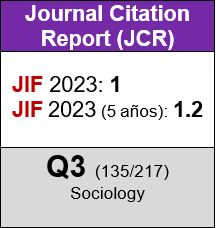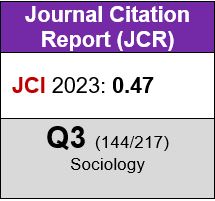La economía que viene. Los efectos de las relaciones sociales digitales sobre el rendimiento, la coordinación y la independencia laboral
DOI:
https://doi.org/10.5477/cis/reis.184.85Palabras clave:
Brecha digital, Capital Tecnológico, Redes Sociales, Tecnologías de la información y la comunicación, TrabajoResumen
El trabajo es uno de los ámbitos que más se ha adaptado a los cambios debidos a la era de la información y la comunicación. Este estudio examina los efectos de las tecnologías de la información y la comunicación (TIC) en los trabajadores españoles: en su rendimiento laboral, en su capacidad de coordinación con los compañeros y en la posibilidad de lograr una mayor independencia laboral. Se han usado dos encuestas del CIS (2014 y 2016) sobre Redes Sociales Digitales. Los resultados indican que la probabilidad de mejorar el rendimiento, la coordinación y la independencia laboral es mayor cuando se usan algunas TIC, existiendo además diferencias sociodemográficas y de estatus socioeconómico, aumentando esa probabilidad, cuando se usa y se tiene conciencia del potencial de la red de lazos fuertes
Descargas
Citas
Ala-Mutka, Kirsti (2011). Mapping Digital Competence: Towards a Conceptual understanding. European Commission. Publications Office of the European Union.
Anghel, Brindusa; Cozzolino, Marianela y Lacuesta, Aitor (2020). El teletrabajo en España. Madrid: Banco de España Eurosistema, Artículos Analíticos.
Bakas, Dimitrios; Kostis, Pantelis y Petrakis, Panagiotis (2020). «Culture and labour productivity: An empirical investigation». Economic Modelling, 85(C): 233-243. DOI: https://doi.org/10.1016/j.econmod.2019.05.020
Brunswicker, Sabine; Matei, Sorin A.; Zentner, Michael; Zentner, Linn y Klimeck, Gerhard (2017).
«Creating Impact in the Digital Space: Digital Practice Dependency in Communities of Digital Scientific Innovations». Scientometrics, 110: 417-442. doi: 10.1007/s11192-016-2106-z DOI: https://doi.org/10.1007/s11192-016-2106-z
Burt, Ronald S. (1992). Structural Holes: The Social Structure of Competition. Cambridge, Massachusetts: Harvard University Press. DOI: https://doi.org/10.4159/9780674029095
Burt, Ronald S. (1997). «The Contingent Value of Social Capital». Administrative Science Quarterly, 42: 339-365. doi: 10.2307/2393923 DOI: https://doi.org/10.2307/2393923
Burt, Ronald S. (2000). «The Network Structure of Social Capital». Research in Organizational Behavior, 22: 345-423. doi: 10.1016/S0191-3085(00)22009-1 DOI: https://doi.org/10.1016/S0191-3085(00)22009-1
Burt, Ronald S. (2004). «Structural Holes and Good Ideas». American Journal of Sociology, 110: 349399. doi: 10.1086/421787 DOI: https://doi.org/10.1086/421787
Cabero, Julio (2004). Reflexiones sobre la brecha digital y la educación. [Conference session]. Tecnoneet 2004: Retos y realidades de la Inclusión Digital. Murcia, España.
Calderón-Gómez, Daniel; Casas-Mas, Belén; Urraco Solanilla, Mariano y Revilla, Juan C. (2020). «The Labour Digital Divide: Digital Dimensions of LabourMarket Segmentation». Work Organisation Labour y Globalisation, 14(2): 7-30. doi: 10.13169/workorgalaboglob.14.2.0007 DOI: https://doi.org/10.13169/workorgalaboglob.14.2.0007
Castells, Manuel (1996). The information Age: Economy, Society and Culture. Volume I: The Rise of the Network Society. Cambridge, Massachusetts: Blackwell.
Castells, Manuel (2001). The Internet Galaxy: Reflections on the Internet, Business, and Society. New York: Oxford University Press. DOI: https://doi.org/10.1007/978-3-322-89613-1
Castells, Manuel (2006). La Sociedad red: una visión global. Madrid: Alianza Editorial.
Castells, Manuel y Tubella, Imma (2007). La transición a la sociedad red. Barcelona: Ariel.
Coleman, James (1988). «Social Capital in the Creation of Human Capital». American Journal of Sociology, 94: 95-120. Disponible en: https://www.jstor.org/ stable/2780243, acceso 20 de marzo de 2020. DOI: https://doi.org/10.1086/228943
Coleman, James (1990). Foundations of Social Theory. Cambridge: Harvard University Press.
Collet, David (2003). Modelling Binary Data. London: Chapman y Hall - CRC.
Cunha, João V. da y Orlikowski, Wanda J. (2008).
«Performing Catharsis: The Use of Online Discussion Forums in Organizational Change». Information and Organization, 18(2): 132-156. doi: 10.1016/j.infoandorg.2008.02.001 DOI: https://doi.org/10.1016/j.infoandorg.2008.02.001
Davis, Fred D. (1986). A Technological Acceptance Model for Empirical Testing New End-user Information Systems: Theory and Results. Cambridge: MIT Sloan School of Management.
Davis, Fred D. (1989). «Perceived Usefulness, Perceived Ease of Use and User Acceptance of Information Technology». MIS Quarterly, 13: 319-340. doi: 10.2307/249008 DOI: https://doi.org/10.2307/249008
Davison, Robert M.; Ou, Carol X. J.; Martinsons, Maris. G.; Zhao, Angela Y. y Du, Rong (2014).
«The Communicative Ecology of Web 2.0 at Work: Social Networking in the Workspace: A Case Study». Journal of the Association for Information Science and Technology, 65(10): 2035-2047. doi: org/10.1002/asi.23112 DOI: https://doi.org/10.1002/asi.23112
Dewan, Sanjeev y Riggins, Frederick J. (2005). «The Digital Divide: Current and Future Research Directions». Journal of the Association for Information Systems, 6(12): 298-337. doi: 10.17705/1jais.00074 DOI: https://doi.org/10.17705/1jais.00074
Dierckx, Marcel A. F. y Stroeken, Jan H. M. (1999).
«Information Technology and Innovation in Small and Medium-sized Enterprises». Technological Forecasting and Social Change, 60(2): 149-166. doi: 10.1016/S0040-1625(98)00043-2 DOI: https://doi.org/10.1016/S0040-1625(98)00043-2
DiMaggio, Paul; Hargittai, Eszter; Neuman, Russel y Robinson, John P. (2001). «Social Implications of the Internet». Annual Review of Sociology, 27: 307-336. doi: 10.1146/annurev.soc.27.1.307 DOI: https://doi.org/10.1146/annurev.soc.27.1.307
Dua, Pami y Garg, Niti K. (2019). «Determinants of Labour Productivity: Comparison between Developing and Developed Countries of Asia-Pacific». Pacific Economic Review, 24(5): 686-704. DOI: https://doi.org/10.1111/1468-0106.12294
European Commission (2019). The Digital Economy and Society Index (DESI). Disponible en: https:// ec.europa.eu/digital-single-market/en/desi, acceso 15 de abril de 2020.
Francis, Jess; Ball, Christopher; Kadylak, Travis y Cotten, Shelia R. (2019). «Aging in the Digital Age: Conceptualizing Technology Adoption and Digital Inequalities». En: B. B. Neves y F. Vetere (ed.). Ageing and Digital Technology, (pp. 35-49). Singapore: Springer. DOI: https://doi.org/10.1007/978-981-13-3693-5_3
Freeman, Linton C. (2004). The development of social network analysis: A study in the sociology of science. Vancouver: Empirical Press.
Granovetter, Mark (1973). «The Strength of Weak Ties». American Journal of Sociology, 78(6): 1360-1380. Disponible en: http://www.jstor.org/ stable/2776392, acceso 14 de marzo de 2020. DOI: https://doi.org/10.1086/225469
Granovetter, Mark (1985). «Economic action and social structure: The problem of embeddedness». American Journal of Sociology, 91: 481-510. Disponible en: https://www.jstor.org/stable/2780199, acceso 14 de marzo de 2020. DOI: https://doi.org/10.1086/228311
Granovetter, Mark (2005). «The Impact of Social Structure on Economic Outcomes». Journal of Economic Perspectives, 19(1): 33-50. doi: 10.1257/0895330053147958 DOI: https://doi.org/10.1257/0895330053147958
Gray, Peter H.; Parise, Salvatore e Iyer, Bala (2011). «Innovation Impacts of Using Social Bookmarking Systems». MIS Quarterly, 35(3): 629-643. doi: 10.2307/23042800 DOI: https://doi.org/10.2307/23042800
Hair, Joseph F.; Black, William C.; Babin, Barry J. y Anderson, Rolph E. (2014). Multivariate Data Analysis. Essex, England: Pearson Education Limited.
Hampton, Keith y Wellman, Barry (2001). «Long distance community in the network society: Contact and support beyond netville». American Behavioral Scientist, 45(3): 476-495. doi: 10.1177/00027640121957303 DOI: https://doi.org/10.1177/00027640121957303
Kilduff, Martin y Brass, Daniel J. (2010). «Organizational Social Network Research: Core Ideas and Key Debates». The Academy of Management Annals, 4(1): 317-357. doi: 10.1080/19416520.2010.494827 DOI: https://doi.org/10.5465/19416520.2010.494827
Kline, Joel y Konstanze, Alex B. (2013). «The Social Body of Knowledge: Nurturing Organizational Social Capital via Social Media Based Communities of Practice». Technical Communication, 60(4): 279-292. Disponible en: https://www.jstor.org/stable/26464357, acceso 18 de septiembre de 2021.
Leonardi, Paul M. y Barley, Stephen R. (2010). «What’s Under Construction Here? Social Action, Materiality, and Power in Constructivist Studies of Technology and Organizing». Academy of Management Annals, 4: 1-51. doi: 10.1080/19416521003654160 DOI: https://doi.org/10.5465/19416521003654160
Leonardi, Paul M. y Neeley, Tsedal (2022). The digital mindset: What it really takes to thrive in the age of data, algorithms, and AI. Brighton, Massachusetts: Harvard Business Review Press.
López, Carolina y Soto, Pedro (2010). «Analyzing ICT Adoption and Use Effects on Knowledge Creation: An Empirical Investigation in SMEs». International Journal of Information Management, 30(6): 521-
doi: 10.1016/j.ijinfomgt.2010.03.004 DOI: https://doi.org/10.1016/j.ijinfomgt.2010.03.004
Mann, Laura (2014). The Digital Divide and Employment. In: Society and the Internet: How Networks of Information and Communication are Changing our Lives. Oxford: Oxford University Press. DOI: https://doi.org/10.1093/acprof:oso/9780199661992.003.0019
Moqbel, Murad; Saggi, Nevo y Kock, Ned (2013).
«Organizational Members. Use of Social Networking Sites and Job Performance: An Exploratory Study». Information Technology y People, 26(3): 240-264. doi: 10.1108/ITP-10-2012-0110 DOI: https://doi.org/10.1108/ITP-10-2012-0110
Mumford, Enid (2006). «The Story of Socioechnical Design: Reflections in its Successes, Failures and Potential». Information Systems Journal, 16: 317-342. doi: 10.1111/j.1365-2575.2006.00221.x DOI: https://doi.org/10.1111/j.1365-2575.2006.00221.x
Neff, Gina (2005). «The Changing Place of Cultural Production: The Location of Social Networks in a Digital Media Industry». The ANNALS of the American Academy of Political and Social Science, 597(1): 134-152. doi: 10.1177/0002716204270505 DOI: https://doi.org/10.1177/0002716204270505
Newman, Alexander; Round, Heather; Wang, Shuanglong H. y Mount, Matthew (2019). «Innovation Climate: A Systematic Review of the Literature and Agenda for Future Research». Journal of Occupational and Organizational Psychology, 93(1): 73-109. doi: 10.1111/joop.12283 DOI: https://doi.org/10.1111/joop.12283
Norris, Pippa (2001). Digital divide? Civic Engagement, Information Poverty and the Internet Worldwide. Cambridge: Cambridge University Press. DOI: https://doi.org/10.1017/CBO9781139164887
Park, Sora (2017). Digital Capital. London: Palgrave Macmillan. DOI: https://doi.org/10.1057/978-1-137-59332-0
Patterson, Malcolm G.; West, Michael A.; Shackleton, Viv J.; Dawson, Jeremy F.; Lawthom, Rebecca; Maitlis, Sally; Robinson, David L. y Wallace, Alison
M. (2005). «Validating the Organizational Climatemeasure: Links to Managerial Practices, Productivity and Innovation». Journal of Organizational Behavior, 26: 379-408. doi: 10.1002/job.312 DOI: https://doi.org/10.1002/job.312
Pigg, Kenneth E. y Cranck, Laura D. (2004). «Building Community Social Capital: The Potential and Promise of Information and Communications Technologies». The Journal of Community Informatics, 1(1): 58-73. doi: 10.15353/joci.v1i1.2062 DOI: https://doi.org/10.15353/joci.v1i1.2062
Ragnedda, Massimo y Destefanis, Giuseppe (eds.). (2021). Blockchain and Web 3.0: Social, Economic, and Technological Challenges. London: Routledge.
Ragnedda, Massimo; Ruiu, Maria L.; Addeo, Felice y Paoli, Andrea D. (2022). «Converting Digital Capital in Five Key Life Realms». Italian Sociological Review, 12(1): 19-40.
Rainie, Lee y Wellman, Barry (2012). Networked: The new social operating system. Cambridge, Massachusetts: The MIT Press. DOI: https://doi.org/10.7551/mitpress/8358.001.0001
Requena, Félix (1991). Redes Sociales y Mercado de Trabajo. Madrid: Centro de Investigaciones Sociológicas y Siglo XXI.
Requena, Félix (2003). «Social capital, satisfaction and quality of life in the workplace». Social Indicators Research, 61: 331-360. doi: 10.1023/ A:1021923520951 DOI: https://doi.org/10.1023/A:1021923520951
Requena, Félix (2008). Redes sociales y sociedad civil. Madrid: CIS.
Requena, Félix y Ayuso, Luis (2019). «Individualism or complementarity? The Effect of Digital Personal networks on Face-to-Face Personal Networks». Information, Communication y Society, 22(14): 2097-2111. doi: 10.1080/1369118X.2018.1477968 DOI: https://doi.org/10.1080/1369118X.2018.1477968
Ruiz-Torres, Paula (2021). COVID-19: Teletrabajo en tiempos de pandemia. Ediciones Complutense. Disponible en: https://revistas.ucm.es/index. php/ HICS/article/view/74237/4564456555847, acceso 25 de octubre de 2022.
Selwyn, Neil (2002). «Defining the ‘Digital Divide’: Developing a Theoretical Understanding of Inequalities in the Information Age». Occasional Paper, 49. Cardiff University. Disponible en: http://www.cf.ac. uk/socsi/ict/definingdigitaldivide.pdf, acceso 7 de octubre de 2020.
Selwyn, Neil (2004). «Reconsidering Political and Popular Understandings of the Digital Divide». New Media y Society, 6(3): 341-362. doi: 10.1177/1461444804042519 DOI: https://doi.org/10.1177/1461444804042519
Souza e Silva, Adriana de y Xiong-Gum, Mai N. (2020). «Mobile Networked Creativity: Developing a Theoretical Framework for Understanding Creativity as Survival». Communication Theory. DOI: https://doi.org/10.33767/osf.io/4fkev
Torrent, Joan y Vilaseca, Jordi (2007). La economía del conocimiento y la empresa red. En: J. Torrent y
J. Vilaseca (dirs.). La empresa red. Tecnologías de la Información y la Comunicación, Productividad y Competitividad (pp. 29-79). Barcelona: Ariel.
Torrent, Joan y Ficapal, Pilar (2010a). «TIC, coinnovación y productividad empresarial: Evidencia empírica para Cataluña y comparación internacional de resultados». Revista de Economía Mundial, 26: 203-233.
Torrent, Joan y Ficapal, Pilar (2010b). «¿Nuevas fuentes co-innovadoras de la productividad empresarial?». Innovar, 20(38): 111-124. Disponible en: https://revistas.unal.edu.co/index.php/innovar/article/view/22295, acceso 17 de julio de 2019.
Torres, Cristobal; Robles, José M.; De Marco, Stefano y Antino, Mirko (2017). «Revisión analítica del modelo de aceptación de la tecnología. El cambio tecnológico». Papers-Revista de Sociología, 102(1): 5-27. doi: 10.5565/rev/papers.2233 DOI: https://doi.org/10.5565/rev/papers.2233
Varlamova, Julia y Larionova, Natalia (2020). «Labor Productivity in the Digital Era: A Spatial-Temporal Analysis». International Journal of Technology, 11(6): 1191-1200. doi: 10.14716/ijtech.v11i6.4429 DOI: https://doi.org/10.14716/ijtech.v11i6.4429
Wellman, Barry; Quan Haase, Anabel; Witte, James y Hampton, Keith (2001). «Does the Internet Increase, Decrease, or Supplement Social Capital? Social Networks, Participation, and Community Commitment». American Behavioral Scientist, 45(3): 436-455. doi: 10.1177/00027640121957286 DOI: https://doi.org/10.1177/00027640121957286
Yan, Yalan; Davison, Robert M. y Mo, Chunyan (2013). «Employee Creativity Formation: The Roles of Knowledge Seeking, Knowledge Contributing and Flow Experience in Web 2.0 Virtual Communities». Computers in Human Behavior, 29(5): 1923-1932. doi: 10.1016/j.chb.2013.03.007 DOI: https://doi.org/10.1016/j.chb.2013.03.007
Yuan, Sun y Shang, Rong-An (2014). «The Interplay between Users Intraorganizational Social Media Use and Social Capital». Computers in Human Behavior, 37: 334-341. doi: 10.1016/j.chb.2014.03.048 DOI: https://doi.org/10.1016/j.chb.2014.03.048
Descargas
Publicado
Cómo citar
Número
Sección
Licencia
Derechos de autor 2023 REIS. Revista Española de Investigaciones Sociológicas

Esta obra está bajo una licencia internacional Creative Commons Atribución-CompartirIgual 4.0.
Permite Compartir — copiar y redistribuir el material en cualquier medio o formato, Adaptar — remezclar, transformar y construir a partir del material para cualquier propósito, incluso comercialmente.








